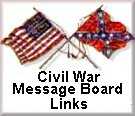In late May of 1861, the First Georgia received orders transferring them to Richmond. They would not remain in the Confederate capital for long, however. Events taking place out west in the Trans-Allegheny section of Virginia had prompted the government to dispatch Brigadier General Robert S. Garnett to the region to secure it for the Confederacy. Colonel Ramsey was instructed to march his regiment west as reinforcements for Garnett's small force, styled as the Army of the Northwest. The Georgians, eager for their chance to fight, were excited at the prospect of engaging the enemy.
On June 10, a correspondent of the Savannah Republican, stationed in Richmond, wrote to his newspaper describing the reaction of the Georgians when they learned of their new assignment:
It is impossible to say how many troops there now are in Virginia, and it would be indiscreet to say, if I knew; but I will venture to remark that your readers would be struck with admiration and amazement, as the future historian will be, at the wonderful energy and activity displayed by a Government and people in bringing such a tremendous force upon the field in so short a time. Let the public, then, be patient, and rest satisfied with the conviction that our civil rulers are equal to the emergency, and that our military operations are confided to leaders of approved courage and sagacity.
The First Georgia Regiment, Col. Ramsay, which arrived here last week from Pensacola, will leave to-morrow or next day for Phillippa, beyond the mountains. It is believed to be the best regiment in the Confederate service, owing to the hard labor, experience and training consequent upon their long service at Pensacola. I was present at a dress parade of the regiment when the order to proceed to Phillippa was read. Col. Ramsay addressed the regiment in a few remarks, the last of which were worthy of Patrick Henry. He said that the invader now pollutes the soil of the Old Dominion by his presence, and that the regiment was here to wash out his foot-prints in his heart’s blood. He then concluded by pointing his sun-burnt hand to the north-west and saying, “There is the road that leads to the enemy—to-morrow we march.” The announcement seemed to electrify the regiment and the vast assemblage of spectators, who sent a round of cheers, not less for the eloquent Colonel, than for the good news contained in the order. Each man in the regiment, in addition to the ordinary arms, is provided with a bowie knife and a repeater, and they leave with the confident expectation of driving the enemy into the Ohio river. After reaching Staunton, the terminus of the railway, they will have to proceed on foot over the mountains a distance of 75 miles. The consider it a short distance however, to any point where the enemy may be found. Col. Ramsay is reported to have said to his regiment on a former occasion, that he desired them to be “the first regiment in this world, and the first in the next.”
Subscribe to:
Post Comments (Atom)
.jpg)










No comments:
Post a Comment